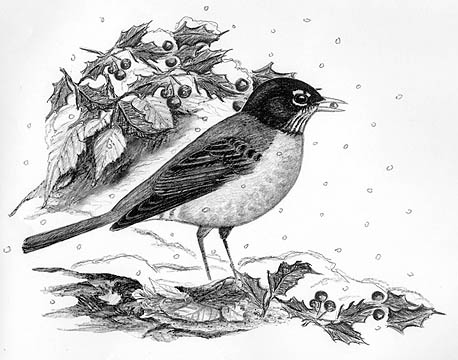
Dear Bird Folks,
From years of reading your columns I have become aware that seeing robins in the winter is no big deal. Still, I wasn’t prepared for the massive number of robins that descended upon my yard after that bad storm a few weeks ago. I wanted to do something for them, but we were plum out of fresh worms. Why had so many robins come to my yard in particular and was there anything that I could have done to help those fat shivering birds?
-Mary, NJ
You Weren’t Alone Mary,
I’d be willing to bet that following that storm, over ninety percent of the calls, letters, faxes, e-mails and encrypted messages from other worlds were from people who were getting flocks of robins in their yards. Every person that I saw, whether it was a customer or just some stalker on the street, would ask “what can I do for the robins?” Apparently robins spent the days following the blizzard in every yard in the northeast. When things are bad the birds look for any port in a storm, even if it’s in New Jersey.
You were right when you said that seeing American Robins in the winter is no big deal. If you were to look at a winter range map, you would see that robins can be found year round across nearly the entire country. The one exception being northern New England, which they often bypass in order to avoid being run over by snow mobiles. You may have heard this before, but many of the robins that we see in the winter are those tough robins from Canada. A cold day for our robins feels like an afternoon in Fort Lauderdale to those guys.
Robins are stout, hardy birds that can handle just about any weather if they are able to find enough food. Their ability to find food is the key to their nationwide presence. As with all creatures, the more varied their diet, the more successful species they are. It is the creatures with specialized feeding habits that suffer in tough times. That’s one of the reasons why Unicorn-eating Hawks have been looking thin in recent years.
If the ground is soft, robins happily dig for bugs or delicious slimy worms. But when the earth is frozen their food of choice becomes fruit and berries. In a mild winter we see very few robins. They are still around, but they spend much of their time in moist woodlands eating wild berries. When deep snow covers up the food the robins head to the neighborhoods. What were the robins looking for in our yards? Anything that they could find to eat. The more severe the weather, the less fussy the birds get. They’ll eat just about any kind of berries or fruit, with most of it being swallowed whole, although pineapples are only swallowed when things are really bad.
Even though robins are a common yard bird, they could hardly be called a common feeder bird. But after that last blizzard just about every yard in the east had robins picking at something. We had calls from people who had robins fighting woodpeckers at the suet feeder and some that were clinging to tube feeders, chowing down sunflower seed. And in one instance a robin was seen dropping quarters into a vending machine, trying to get a package of gummy worms. The irate bird was seen later in the day kicking the machine when it realized that the worms were made of candy.
Even desperate robins aren’t always willing to come to feeders. The best that we can do for them is to put out a variety of foods. Based on the feedback from customers, raisins and currants seem to be the most popular choices. Some people soak them first, while others don’t. Other fruit like blue berries or small grapes may also be eaten. For an experiment I lined the railing of my deck with large frozen blueberries. The birds didn’t eat them, but the squirrels were thrilled and the berries left lovely stains on my railing. No good deed goes unpunished.
Other foods to try are suet chopped up on a tray, and sunflower seeds without the shells. Even bakery goods have reportedly been eaten by hungry robins. However, I’d avoid offering bran muffins if you aren’t in the mood to wash your windows.
Lastly Mary, you should know that robins and bluebirds are in the same family, so whatever works to attract robins should work for bluebirds. Putting out any of the aforementioned foods, plus meal worms and fresh water, could also get you a flock of bluebirds. But whatever you do, don’t offer any gummy worms or you might find yourself being kicked in the shins by an angry robin or a mad bluebird.